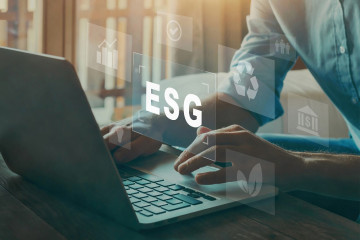
ESG Resource Guide
- United States
- What is ESG? Your Guide to Understanding Environment, Social, Governance
In this ESG Guide You'll Find:
ESG Defined
ESG stands for Environmental, Social, and Governance. Together, these three aspects make up a framework to evaluate issues pertaining to a company’s long-term health and prosperity. For many investors, it’s not enough to check off two boxes and leave one totally blank. They’re searching for thoughtful, forward-looking policies and programs in all three of these areas:
- Environmental: The direct and indirect impacts an organization has on the environment and natural resources.
- Social: The impact an organization has on the direct workforce, workers in the supply chain, and communities in which it operates.
- Governance: The leadership structure of an organization and the policies and procedures in place to operate in an ethical manner including management of impacts to people and the environment.
The full scope of an ESG strategy examines not only how an organization is presently performing in these areas, but also how it plans to meet future targets for improvement and long-term resiliency.
Whether you’re a seasoned professional or just getting started in the realm of ESG, there is always more to learn in today’s rapidly changing business landscape. Below you’ll find a range of information, resources, and case studies to help you better understand and navigate ESG in your business.
To achieve a cleaner, safer, more sustainable world, all companies must realize the importance and value of managing Environmental, Social, and Governance (ESG)-related business challenges in a way that fits their pace and unique objectives. And as the industry landscape shifts to prioritize socially responsible business practices, ESG has become a critical business focus.
In this ebook, we provide a detailed look into what ESG is and how it is becoming a key framework in evaluating the health and resiliency of a business’s operations. It will walk you through the process of developing and implementing an ESG program that can fit the scope and scale of your business operations.
This ebook will help you gain a better understanding of the following key topics:
- What is ESG?
- ESG vs CSR — What’s the Difference?
- 7 Steps to Develop and Implement an ESG Strategy
- Why Today’s Businesses Should Invest in ESG
Download Our ESG Ebook Here
ESG in Your Business
As the greater landscape of industry shifts beneath our feet, a crucial element is quietly evolving with it: the expectations of investors. To determine the value of a potential investment, firms have begun using a specific set of criteria designed to evaluate a company’s sustainability. That is to say, how well will the company hold up to environmental scrutiny? How strong are its relationships in its social ecosystem? Is leadership transparent or will they end up in the headlines in a few years? These questions address investor priorities that have been developing for years, and the focus has been shifting toward socially responsible investing. And with ESG standards, they’ve gotten better than ever at asking them.
A quarter of all sustainable investing is through ESG-integrated funds, far outpacing all other sustainable investment strategies. In fact, ESG investing grew 143% between 2016 and 2020.
Businesses that incorporate ESG as a regular part of doing business are therefore more attractive to investors since the broader scope of data provides a more accurate reading of financial risk and opportunity.

Learn About Our ESG Advisory Services
Environmental, Social, and Governance (ESG) is quickly emerging as the leading business strategy to evaluate the overall health of a business’s operating model and the company’s long-term resiliency. Stakeholders are increasingly investigating and in some cases, demanding, thoughtful, forward-looking policies and programs that incorporate environmental and social impacts and how they are governed. At Antea®Group, our consultants have the strategic thinking and technical expertise to provide client-specific advisory that helps clients navigate, understand, and proactively manage their ESG risks and opportunities to embed a programmatic approach that lasts.
Learn MoreWhile companies find ways to tackle day-to-day challenges, it’s important to keep sight of the big-picture and establish a strong ESG program framework that can withstand the test of time, investor demands, and cultural shifts. Being proactive in ESG allows time to build more programmatic strategies versus one-off reactions to current events.
Here are seven steps to develop and implement an ESG strategy that highlights how Antea Group helps companies take a methodical approach to building scalable and efficient ESG programs and processes. While we focus on ESG as a whole, the process can be applied to select aspects of ESG as relevant to your industry and business.
- Perform an Impact Screening
- Conduct a Materiality Assessment
- Assess Current State Baseline
- Define Visions and Goals
- Develop a Strategic ESG Roadmap
- Implementation of Action Plans
- Report Your Progress
ESG vs. CSR vs. SRI
Corporate culture has never been more transparent or important than it is now. Sustainability leaders, investors, employees, and consumers are choosing companies that align with their values. Millennials in particular have been cited as key to this shift through their spending power and ability to publicize support or dissatisfaction widely.
Corporate Social Responsibility (CSR), Socially Responsible Investing (SRI), and Environment, Social, and Governance (ESG) policies guide business practices and inform the public about the values, goals, and risks of a company.
What Is CSR?
Corporate Social Responsibility covers the overarching social, environmental, and economic concerns in a company’s policies, practices, and decision-making. CSR commitments serve as keystones for corporate culture and give employees, investors, and consumers insight into company values. They are generally self-regulated and can vary widely. Though CSR is about accountability, the qualitative nature of CSR makes it difficult to pin down. The will, values, and spirit of corporate culture can be captured by CSR which serves as a starting point to get to the next step of measurable, data-driven change.
What is SRI?
Socially responsible investing is using a screening process that allows investors to independently determine investments based on ethical considerations and socially responsible behaviors.
While the criteria used to judge SRI may overlap with those measured through ESG, there are no metric-based assessments carried out. Rather, an SRI strategy takes into account ethical considerations such as:
- The charitable activity of an organization.
- Production of goods and materials that may be seen as socially harmful, such as tobacco.
- Production of weapons and firearms.
- A history of human rights violations within the organization or their supply chain.
- Corporate practices that are harmful to the environment.
Ultimately, ESG goes beyond what standard financial assessments offer by taking a closer look at environmental, social, and governance factors. Businesses that incorporate ESG as a regular part of doing business are therefore more attractive to investors since the broader scope of data provides a more accurate reading of financial risk and opportunity.
ESG practices can be used to evaluate how well a company is adhering to the sustainability and corporate responsibility goals they set. ESG plans requires measurable goals, data collection, and reporting.
ESG Practices Powered by AI
Driven by a heightened interest in responsible investing, ESG has become a significant factor in evaluating the long-term prospects of organizations around the world.
Amid this shift, the convergence of ESG with AI technology presents an exciting opportunity. The growing interest in AI's capabilities to enhance business processes is mirrored in its potential to reshape ESG practices. AI's data-driven capabilities have the potential to revolutionize how companies approach sustainability and responsible investing.
As the business world continues to recognize the potential of ESG to drive positive change, the integration of AI technology stands poised to amplify these efforts. AI is being leveraged in areas including:
- Data Collection
- Regulatory Compliance
- Reputation Monitoring
- Trend Identification
- Empowering Sustainable Investing
Balancing Risk and Reward with AI and ESG
Transparency and ethical AI practices are integral to mitigating any risks AI presents. Transparent AI algorithms allow stakeholders to understand how decisions are made and ensure accountability. Implementing ethical AI practices involves not only data privacy and bias prevention but also clear communication of the purpose and impact of AI-driven ESG insights.
When integrating AI into ESG practices, striking a balance between harnessing AI's potential to enhance sustainability and addressing concerns related to the very environmental, social, and governance issues ESG tracks is essential for maximizing its benefits.
Creating an ESG Action Plan
As a business leader, it's clear that the time to act on your ESG strategy is now. What’s not so clear is how to get started.
Putting together a comprehensive action plan will help get the ball rolling on your ESG goals and drive progress on your initiatives. From clearly outlining your aspirations, to identifying relevant stakeholders, to communicating the value of the work, an ESG Action Plan will help you set up the right framework to succeed.
An ESG Action Plan lays out the critical areas of focus that will help you go from identifying key ESG topics to taking action and making progress. An action plan will include the following information:
- What ESG topic to focus on
- Who needs to be involved
- Why it will drive business value
- When it will be completed
- How to do it
Navigating the Politics of ESG
During recent election cycles, it's been almost impossible to ignore the controversy swirling around ESG investing in certain corners of the political arena.
As a business leader who is vested in the financial and regulatory implications of ESG going forward, you might find yourself wondering what’s driving the criticism, and what it all might mean for the future of corporate sustainability.
Fortunately, even with all of the country’s divisions along political lines, ESG doesn’t seem to be one of them: a survey last year found broad bipartisan support for corporate ESG efforts.
This is the main reason it’s almost impossible to envision ESG losing its place as a massive investment and business growth priority. The battle against climate change is increasingly one that unites us as a society and as a species. While it’s only natural there would be contrasting opinions and philosophies on the best ways to approach ESG policy, few people seem to believe these criteria should not exist.
“I detect no groundswell of opposition to ESG in the investment industry,” wrote Dr. Jon Hale, Global Head of Sustainability Research at Morningstar, Inc., in a recent article.
He notes that in one recent survey, 85% of asset managers indicated that ESG has become a priority for them. Another survey found that a large majority of asset owners believe ESG to be financially relevant to the investment process. Companies everywhere are seeing the essential benefits of a strong ESG position.
That’s not to say there isn’t significant room for improvement in terms of how ESG is approached, measured, and managed.
Reporting and Frameworks
In recent years, ESG has become increasingly mainstream due to a combination of factors. Investors see the value in ESG and are demanding ESG information from companies, regulators are starting to require corporate disclosure on certain ESG issues, the impacts of climate change are growing and readily apparent, and companies are being asked to not only be profitable but do so in a way that minimizes their impacts on people and planet.
To help companies meet the demands for ESG reporting and transparency, several frameworks and standards have been created.
Standards provide an agreed level of quality requirements for reporting on ESG topics. A standard gives a specific outline of what should be reported on each topic.
Frameworks on the other hand provide the ‘frame’ to contextualize information – they outline how information should be structured. A framework can be thought of as a set of principles providing guidance and shaping people’s thoughts on how to think about ESG topics.
Together, ESG standards and frameworks help companies efficiently disclose high-quality ESG data that can be easily compared across topics and industries. It also helps to create consistency in formatting that creates transparency around key ESG topics.
Below we dive into a few common standards and frameworks:
- Global Reporting Initiative (GRI): A widely used set of ESG standards that help businesses and other organizations report their impacts on the economy, environment, and people to meet the needs of a wide variety of different stakeholders.
- Sustainability Accounting Standards Board (SASB): Publishes 77 industry-specific standards to help facilitate the disclosure of financially-material ESG information by companies to an investor audience.
- Task Force on Climate-related Financial Disclosures (TCFD): Provides a framework for corporate disclosure to investors on several climate-related topics including risk management, strategy, governance, and metrics and targets.
ESG Webinars On-Demand
ESG Enhancement: A Post-Acquisition Playbook
Join our on-demand webinar and learn how to integrate ESG throughout the investment lifecycle. Let us show you how to maximize your value creation efforts for every investment through ESG. You will hear from Antea Group experts in mergers & acquisitions, sustainability, and private equity, leveraging deep technical ESG knowledge and strategic expertise in deploying ESG strategies within companies. You'll walk away with a playbook on how to use ESG to attract and manage capital, reduce risk, increase cost savings, boost your reputation, and drive long-term value across your portfolio.
Watch Now

The ESG Evolution: A Firsthand Look at How (and Why) Two Tech Companies Are Tackling ESG
In this webinar, we facilitate a discussion with ESG leaders from Jack Henry & Associates and Commvault to learn more about how they’ve responded to the increased focus on ESG over the past year. Jack Henry & Associates, Inc., a financial services technology company, and Commvault, a global intelligent data management company, are two firms with no direct manufacturing operations that have recently embarked on their own ESG journeys.
You will hear different industry perspectives on why ESG is important to these organizations, how they’ve seen ESG evolve, and what each company has done to monitor and manage the changing ESG landscape.
Watch NowEasy as Pie: Using Your EHS Program to Elevate Your ESG Strategy
Over the past few years, companies have been actively developing programs and disclosing their performance on Environmental, Social, and Governance (ESG) activities – the non-financial indicators that investors and other stakeholders view as key to assessing performance in the marketplace. Several ESG disclosure frameworks have sought to standardize the disclosures relevant to various sectors and allow for apples-to-apples comparison of non-financial performance. This webinar will convene ESG and EHS experts to discuss how EHS compliance programs contribute to robust and complete ESG programs and disclosures, and some key steps that companies can take to better integrate the two fields.
Watch Now
ESG Across Industries
Energy
Global energy generation is driven by a variety of sources. While fossil fuels are still by far the largest share of the market, renewables are the fastest growing as both efficiencies in renewable generation and consumer demand for more sustainable sources of energy increase. Overall demand for energy has rebounded after the unprecedented bottoming out of the energy sector in 2020. Forecasts indicate that with this boom in demand, energy consumption will outpace the anticipated growth in renewables in the immediate future.
All of this is happening against the backdrop of international efforts to reduce carbon emissions, the method widely acknowledged by climatologists and governments as most effective for slowing the rise of global temperatures.
During this time of energy transition, ESG frameworks will be crucial in helping energy companies better understand how their business interacts with and affects the natural environment and society and planning next steps for building more resilient operations.
Retail & Consumer Goods
In recent years, climate change has been making its way into news, media, and even pop culture more and more often. In its latest report, the Intergovernmental Panel on Climate Change (IPCC) highlights the increasingly urgent risks confronting the globe as impacts from climate change mount. As a result, consumer demand for corporate responsibility, transparency, and accountability is rising to new heights — especially when it comes to sustainable business practices, ESG strategies, and combating climate change.
This is particularly true in the retail and consumer goods industry.
According to Yale Program on Climate Change Communication research, 41% of Americans say that over the next 12 months, they intend to reward companies that are taking steps to reduce global warming more frequently than they do now.
Another study conducted by Deloitte found that consumers' top five concerns for sustainable or ethical practices include:
- Producing sustainable packaging and products
- Reducing waste in the manufacturing process
- Committing to ethical working practices
- Reducing the carbon footprint
- Respect for human rights
In other words, consumers no longer want companies to have ESG and sustainability strategies - they expect them. These expectations are especially high among the Gen Z cohort who was reported to have $360 billion in disposable income in 2020.
So, the question is, how can you show the consumer you are both talking the talk and walking the walk with your environmental and social practices?
Technology
The tech industry has already been making an impact in ESG spaces. Tech giants Apple and Salesforce were among those requesting more stringent regulations around ESG reporting.
While on the surface an industry requesting more regulation may seem counter-intuitive, the tech sector does stand to benefit from driving ESG forward, in terms of appeal to both investors and consumers.
One of the greatest opportunities for the tech industry at this moment lies in creating the next generation of technology that can curb climate change and improve systems used to combat existing consequences. Alongside improved green energy storage and technology used to combat forest fires with AI and machine learning-powered drones, there are opportunities for tech to help other industries reach their ESG goals.
As Microsoft President Brad Smith recently noted, “Cloud-based digital services, the better use of data, and rapid advances in AI will create new opportunities for us to help every organization achieve more progress in addressing the world’s climate and energy needs.”
Finance
ESG has become a hot topic as of late in the financial community.
In fact, according to the 2020 Edelman Trust Barometer Special Report: Institutional Investors, 96% of US investors expect their firm to increase the prioritization of ESG as an investment criteria.
Image source: 2020 Edelman Trust Barometer Special Report: Institutional Investors
Luckily, there are many benefits to ESG integration. Not only will it help meet the demands of both internal and external stakeholders, but it will also give your business an opportunity to get ahead of the curve. This is a great strategy to bolster the reputation of your company and carve out a competitive differentiator for your business and begin to build value. It can be a great way to build relationships which will aid in fundraising when needed. And finally, ESG integration can help identify and mitigate ESG-related risk at the onset of acquisition, which could save valuable time, money, and resources from the start.
When considering ESG integration as part of your firm’s investment thesis, there are three key stages to consider in a potential acquisition:
- Pre-investment: during this stage, begin to define how you will determine which ESG topics are financially material to the business, how you plan to screen for risks and opportunities against those topics, and how you can effectively integrate the findings into your investment considerations.
- Active Ownership: at this stage, consider your approach to building value into the company around ESG post-acquisition. What is the timetable for integrating and realizing a new ESG strategy and how will you track and communicate the progress along the way?
- Exit Considerations: in this final stage, define your approach to effectively articulating the value you’ve created through improved ESG performance.
Trending ESG News & Resources
Keeping up with the latest ESG trends and developments can feel like a full-time job. In the fast-changing and increasingly urgent world of ESG, regular updates can be especially helpful. Check out the resources below to stay up to date on all the latest:

Get in Touch
Still have questions or need support on your ESG initiatives? Reach out to our ESG and Sustainability experts today!
Contact UsYou are using an old version of Edge.
Please note some functionalities might not be supported in this version of Edge.
Download the latest version here






















